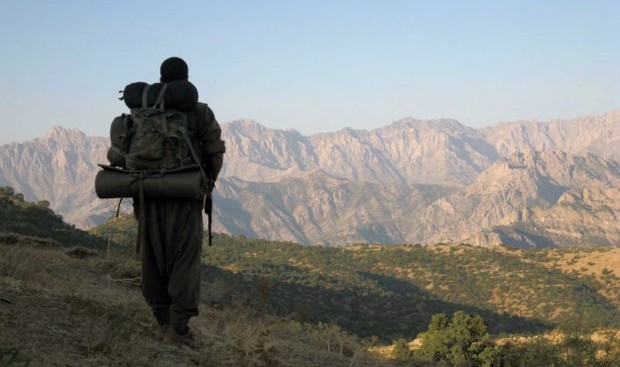
This photo, taken on Tuesday May 7, 2013 and provided by Firat News Agency on Wednesday May 8, 2013, shows a rebel of the Kurdistan Workers’ Party (PKK) in Turkey close to the border with Iraq. (AP Photo/Firat News Agency)
PKK fighters began to withdraw from southeastern Turkey on Wednesday night, heading for safe havens in Iraqi Kurdistan after Turkish forces pledged to turn off night-vision devices between 1 and 4 am to allow the Kurdish rebels to withdraw safely.
This represents the first step—and a vital one—in a historic peace process launched by PKK leader Abdullah Öcalan from his jail cell in Turkey.
PKK sources revealed that the phased withdrawal will take approximately three to four months, given that approximately 5,000 fighters are scattered across the country. If completed, the ceasefire agreement will end the PKK’s bloody 30-year conflict with Ankara, which has resulted in more than 40,000 people deaths.
Diyar Qamishlu, a member of the PKK command’s Foreign Relations Office, informed Asharq Al-Awsat that “the entire withdrawal process depends on Turkey’s position, particularly that of the Turkish army, and we have already warned that that the military targeting of our withdrawing fighters would mean the end of the process.”
The secretary of the Kurdistan Democratic Party (KDP), Fadel Merani, welcomed the withdrawal process. He said: “The success of the peace process in Turkey will guarantee a place in history for those responsible.”
He expressed optimism about Ankara’s future policy, saying: “This marks a major transformation in the Turkish government’s policy. It is possible that in the near future some Kurdish parties, such as the PKK and the Peace and Democracy Party (BPD), will be officially certified to engage in the political process in Turkey.”
Merani also called on the Ankara government to release PKK leader Abdullah Öcalan. The PKK leader was captured in 1999 and was initially sentenced to death. His punishment was commuted to life imprisonment after Ankara abolished the death penalty. In a surprise move earlier this year, Öcalan issued a historic ceasefire call from his Turkish prison cell. He announced that “we have reached the point where weapons should be silent and ideas and politics should speak,” opening the door to a long-awaited truce.
Muhammad Amin Benjouni, a Kurdish political figure who observed the negotiations leading to the PKK pullback, informed Asharq Al-Awsat that “the [Kurdish] militants will head to the area of Mount Qandil, near the Iraqi–Turkish border, [where] they will settle permanently.”
Asked about the role of the Kurdistan Regional Government (KRG), Benjouni said: “The KRG is obliged to provide the rebels with all possible means to ensure their settlement [in Mount Qandil].”
Since its foundation in 1987, the PKK has been involved in a bloody armed conflict with the Turkish government over Kurdish rights. Although Murat Karayilan officially replaced Öcalan as PKK leader following his imprisonment, Öcalan continues to be revered as a cult figure by the Kurds. In his open letter released last March, Öcalan portrayed the prospective ceasefire as a “new phase” in the Kurdish struggle.
“Now a door is opening to a phase where we are moving from armed resistance to an era of democratic political struggle,” he added.
Asharq Al-Awsat visited Mount Qandil, near the Iraqi–Turkish border where the PKK rebels are heading. It is believed that the PKK rebels will take up residence in camps that include health and cultural centers. However, there appears to be no intention on the part of the PKK leadership to move these fighters to the cities of Iraqi Kurdistan.
